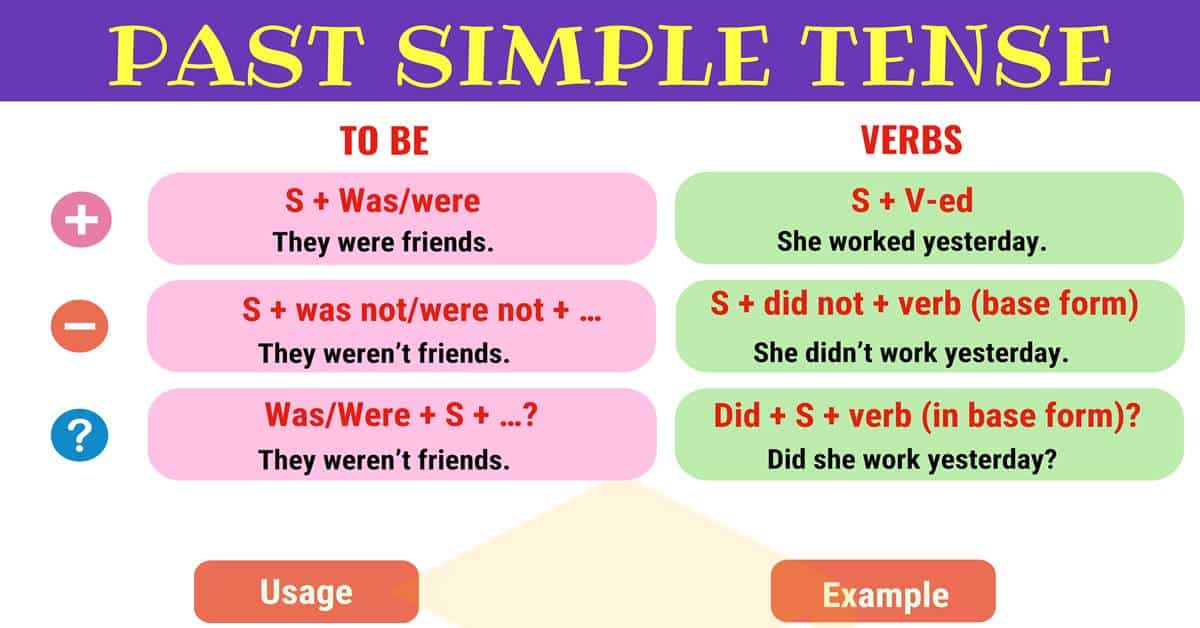Introduction
The word Tense is a term in English grammar and refers to a form of the verb that indicates time. Time is a universal, non-linguistic concept with three divisions - Past, Present and Future; by tense, we understand the correspondence between the form of the verb and our concept of time. When making a statement it is essential to indicate whether a situation exists now, existed in the past or is likely to exist in the future.
The simple past tense (also called the past simple tense, past indefinite tense, preterite tense, or past time) is a verb tense that is used to refer to things that happened or were done at an indefinite time before now. It is past tense, and it often refers to things that were completed in the past, but that is not always the case.
Simple Past Tense - Rules and Examples | English Grammar
✅ Rule 1
This tense is used to express actions which occurred in the past; such as,
- Hira Lal bought two cups of tea.
- I bought this shirt in Mumbai.
- His aunt came back from Dubai.
✅ Rule 2
Expressing past habitual actions; as
- I went to the Cathedral on Sundays.
- He played badminton in his childhood.
- He always came to meet me.
- I always carried my identity card with me.
✅ Rule 3
Referring to situations related to past time.
- My uncle was seriously ill.
- It was night.
- I was helpless that day.
- He was absent from the class that day.
✅ Rule 4
We use Simple Past or Present Perfect tense when adverbs of time, as - today, this morning, this month,
this year, recently etc. are used; as
- I saw him today. (Past Indefinite)
- I have seen him today. (Present Perfect)
- I saw this movie this week. (Past Indefinite)
- I have seen this movie this week. (Present Perfect)
✅ Rule 5
We use Simple Past tense after - It is high time, It is about time, It is time etc.; as,
- It is high time we left for the Railway Station.
✅ Rule 6
Past Indefinite is used for the action which continues; as,
- While the mother cooked, the children played.
- While my wife cooked, I watched T.V.
✅ Rule 7
Past Indefinite is used in sentences expressing Past habitual actions where - always, never, seldom, often, rarely, Used to/would, once a day/week/month, daily, every day/week/month/year etc. are used; as,
- My father used to get up early in the morning.
- Salim would wait for his beloved friend for hours.
- My mother used to take care of me.
✅ Rule 8
In conditional sentences, when if clause is used. It refers to the present of future time; as,
- If you worked hard you might pass the examination.
- If he comes on time, I would pay him his salary.
✅ Rule 9
Simple past tense is used with supposition sentences beginning with - if, as if, as though, I wish, if only, we wish, He/She wishes etc.; as,
- I wish I were the Prime Minister of India.
- If I became the Mayor of Allahabad. I would solve all the Civic problems of the people.
- He talks to me as if he were my boss.
✅ Rule 10
When there are two clauses in a sentence i.e. two kinds of actions are going, on with the previous action Past Perfect tense is used and with the subsequent action Past Indefinite tense is used; as,
- The bus had departed before we reached the bus station.
- We reached the bus station after the bus had departed.
✅ Rule 11
If some action is going on in the Past time and in the meantime, another action occurs, in such a situation, we use Past Continuous tense for the action going on and Past Indefinite for the subsequent action; as,
- I was having my lunch when Rustam came.
- When I was reading a book, Paragi arrived.
- While I was planting a sapling, an insect bit me.
✅ Affirmative Sentences
Pattern:
➤ Subject + verb (IInd form) + O/A.
- He saw a lion in the forest.
- She wrote him a letter yesterday.
✅ Negative Sentences
Pattern:
➤ Subject + did not + verb (Ist form)+ O/A.
- I did not meet him yesterday.
- She did not complete her work in time.
✅ Interrogative Sentences
Pattern:
➤ Did + subject + verb (Ist form) + O/A?
➤ Q.W. + did + subject + verb (Ist form) + O/A?
- Did you see a boy on the way?
- Why did you break the table?
You May Also Like 👇
Loading...


You have a mistake in your rule picture
ReplyDeleteThank you for your comment. Please highlight where the mistake is.
Delete